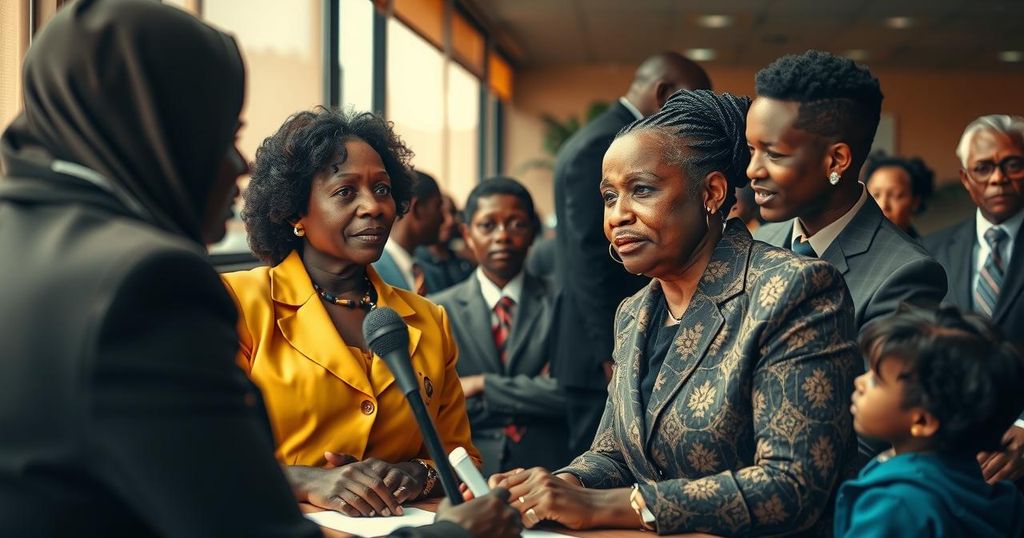World news
2024 ELECTIONS, AFRICA, AFRICAN NATIONAL CONGRESS, BRITAIN, DEMOCRACY, ELECTIONS, ELECTORAL PROCESS, GOVERNANCE, GOVERNMENT, INDEPENDENT PATRIOTS FOR CHANGE, IPC, ITULA, NANDI - NDAITWAH, NET, NEW INDEPENDENT PATRIOTS FOR CHANGE, NEWCASTLE, SOUTH AFRICA, SOUTHERN AFRICA, SWAPO
Sofia Rodriguez
0 Comments
Namibia Elects First Female President Amid Contested Elections
Namibia has elected its first female president, Netumbo Nandi-Ndaitwah, who won 57% of the vote in a contested election. Despite criticisms regarding the electoral process and opposition claims of illegal voting extensions, Nandi-Ndaitwah’s victory emphasizes her appeal as a stable diplomatic figure within the ruling Swapo party.
Namibia recently marked a significant milestone by electing its first female president, Netumbo Nandi-Ndaitwah, who has been announced as the victor of the presidential elections held last week. Nandi-Ndaitwah, currently serving as the vice-president, secured 57% of the votes, contrary to forecasts suggesting that a runoff might be necessary. The ruling Swapo party, which gained power in 1990 following Namibia’s independence from apartheid South Africa, has thus extended its tenure.
The announcement of Nandi-Ndaitwah’s victory was made late on Tuesday, where the 72-year-old leader expressed that “the Namibian nation has voted for peace and stability.” Her political journey includes significant involvement in the independence movement during the 1970s, culminating in her promotion to vice-president following the unfortunate passing of President Hage Geingob earlier this year.
However, the electoral process faced substantial criticisms as opposition parties voiced their discontent regarding the results, citing major technical failures, including ballot paper shortages that forced an extension of the voting period until the following Saturday. The opposition contends that this extension was unlawful and is preparing to contest the election results in court. Notably, Panduleni Itula, who previously practiced dentistry in the United Kingdom before returning to Namibia, secured a distant second place with 25.5% of the votes.
Despite challenges, Nandi-Ndaitwah’s achievement signifies a departure from regional trends where incumbent liberation parties have faced backlash from younger voters. In contrast, South Africa’s African National Congress lost its parliamentary majority for the first time since the end of apartheid. Observers note that Nandi-Ndaitwah’s status as a skilled diplomat, unbesmirched by corruption controversies, contributed to her electoral success and bolstered public confidence. This election reinforces the Swapo party’s influence while highlighting the evolving political landscape in southern Africa.
The recent election in Namibia represents a pivotal moment in the nation’s history, particularly as it witnesses the ascent of its first female president. The Swapo party, which has governed since Namibia gained independence in 1990, has remained steadfast in its grip on power, even in the face of emerging opposition and challenges within the electoral framework. The democratic transition in Namibia stands in contrast to neighboring countries where entrenched power dynamics have recently shifted as younger, discontented voters voice their demands for change.
In conclusion, Namibia’s election of Netumbo Nandi-Ndaitwah as its first female president underscores a notable achievement for gender representation in leadership. This event also reflects the complexities of contemporary Namibian politics, particularly amidst opposition grievances related to electoral integrity. As Namibia navigates its future, the continued dominance of the Swapo party and the emerging challenges from opposition forces will shape the political landscape in the years to come.
Original Source: www.theguardian.com




Post Comment